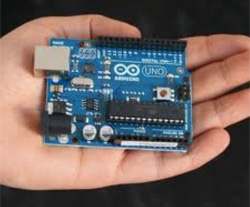Conference & Stage Expo
A Microprocessor for All Seasons

A special double session will be a highlight of the 2013 Annual Conference & Stage Expo programming in Milwaukee, Wisconsin. The Arduino Super Session is scheduled for Saturday afternoon, March 23 at the Frontier Airlines Center.
An Arduino is an inexpensive, open-source, physical computing platform based on a simple microcontroller board and a free development environment for writing software for the board.
Arduino can be used to develop interactive objects, taking inputs from a variety of switches or sensors, and controlling a variety of lights, motors, and other physical outputs. Arduino projects can be stand-alone or they can communicate with software running on a computer (e.g. Flash, Processing, MaxMSP). The boards can be assembled by hand or purchased preassembled; the open-source IDE can be downloaded for free.
Arduino simplifies working with microcontrollers, but it offers some advantages for teachers, students, and interested amateurs over other systems:
This is an introductory, hands-on Arduino super-session. Participants will have an opportunity to program the Arduino to control real world devices. The first hour will be dedicated to software and hardware setup using the Arduino Integrated Development Editor. Students will develop a basic "Hello World" program with LEDs. The remainder of the session will focus on input with sensors and controlling output devices (5vDC, 12 vDC, 120 vAC). This session is limited to 32 participants. Bring project ideas and give it a go! All hardware will be supplied for this session; participants must provide a computer with USB port and have the Arduino software and processing downloaded on the computer prior to arriving at the convention center.
Arduino boards are relatively inexpensive compared to other microcontroller platforms. The least expensive version of the Arduino module can be assembled by hand, and even the pre-assembled Arduino modules cost less than $50. The Arduino software runs on Windows, Macintosh OSX, and Linux operating systems. Most microcontroller systems are limited to Windows.
The Arduino programming environment is easy to use for beginners yet flexible enough for advanced users to take advantage of. For teachers, it's conveniently based on the Processing programming environment, so students learning to program in that environment will be familiar with the look and feel of Arduino.
The Arduino software and processing are published as open source tools available for extension by experienced programmers. The language can be expanded through C++ libraries, and people wanting to understand the technical details can make the leap from Arduino to the AVR C programming language on which it's based. SImilarly, AVR-C code can be added directly into Arduino programs.
The Arduino is based on Atmel's ATMEGA8 and ATMEGA168 microcontrollers. The plans for the modules are published under a Creative Commons license, so experienced circuit designers can make their own version of the module extending it and improving it. Even relatively inexperienced users can build the breadboard version of the module in order to understand how it works and save money.

